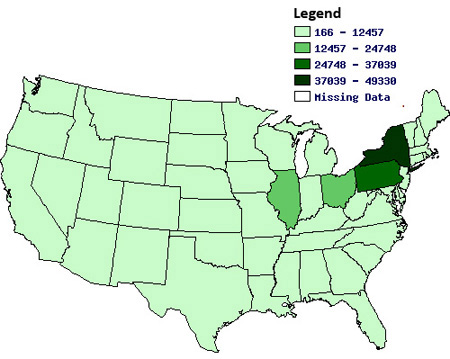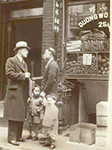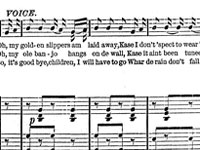United We Stand: Industry and Famous Strikes
As the work of another school year begins, Labor Day reminds us to honor the nation's workers. Since the rise of industry, workers have used strikes and other forms of protest to demand change and recognition. Select the correct answer for each of the labor-related questions below.

1. What U.S. census data does this map portray?
a. The 1930 relative concentration of "totally unemployed persons registered" in each state.
b. The 1870 relative amount of "total capital invested (in dollars) in manufacturing" in each state.
c. The 1920 relative concentration of "manufacturing establishments" in each state.
d. The 1950 relative concentration of "employed females" in each state.
By 1920, industry had established itself as a fixture of the American economy and way of life, though its hubs remained in the Mid-Atlantic. New York continued to be a center of industry, and Illinois, with the continuing rise of Chicago as an urban industrial center, had become one, as well.
2. On May 4, 1886, a peaceful workers' rally in Chicago's Haymarket Square ended in death and confusion when a dynamite bomb was thrown into a line of approaching police officers. The Haymarket Affair received nationwide media attention and the trials of the alleged guilty parties went all the way up to the U.S. Supreme Court. Four of the accused were hung and a fifth committed suicide.
What reform was the rally supporting?
a. The removal of hazardous parts-manufacturing machinery from a McCormick Harvesting Machine Company plant.
b. The passing of a minimum-wage law in the state of Illinois.
c. The paying of compensation to workers who suffered debilitating injuries from repetitive factory work.
d. The institution of the eight-hour workday.
The speakers at the Haymarket Affair supported strikers who had engaged in a May 1 nationwide walkout to support an eight-hour workday. On May 3, the first workday after the walkout, police killed two workers outside a McCormick plant during a confrontation between scabs (temporary workers hired to replace strikers) and strikers. This event provided an impetus for the Haymarket rally.
3. On February 6, 1919, more than 60,000 Seattle workers refused to work, marking the high point of a series of strikes and unrest that started in January 1919. The first labor action to effectively shut down an entire city, this strike hoped to secure what result?
a. The reinstatement of workers ousted by returning soldiers.
b. A pay raise for the city's shipyard workers.
c. The cessation of all U.S. hostilities against the Bolshevik Red Army in Russia and of any support for forces opposing the Red Army.
d. A stop to the installation of new machinery that would reduce the work force necessary in the shipyards.
During World War I, the government imposed wage controls, keeping the wages of Seattle shipyard workers down even as the shipyards expanded through war production contracts. Following the war, the workers expected a raise in their wages; when denied, approximately 25,000 members of the Metal Trades Council union alliance went on strike. A general citywide strike followed, with about 35,000 other workers striking in support of the shipyard protest. The strike officially ended on February 11—though not before touching off a widespread "Red Scare."
4. On December 30, 1936, the workers at Flint, Michigan's General Motors automobile plant began a six-week long strike to press for better working conditions. Organized by the United Auto Workers, the strike used what relatively unusual technique to make its point?
a. Strikers not only stopped working during the strike, but left town entirely, taking their families with them.
b. Strikers remained entirely silent during the strike.
c. Strikers, instead of picketing outside of the factory, occupied the factory, preventing upper management and law enforcement from entering.
d. Strikers sabotaged the factory's power supply, re-sabotaging it whenever plant management repaired it.
Known as the Flint Sit-down Strike, this strike used techniques later adapted by the civil rights movement. On December 30, workers sat down at their places and refused to leave the factory for six weeks. Provided food and supplies by supporters, the workers repelled attempts by the police to drive them out and even initiated the surprise takeover of another plant in the last two weeks of the strike.
 The map of the 1920 concentration of manufacturing establishments was generated by the University of Virginia Library's Historical Census Browser. The browser provides searchable census data for 1790 through 1960, with the option to visualize any data selections in maps such as the one above; all of the categories mentioned in Question One are categories available on the website. For Teachinghistory.org's review of the Historical Census Browser, go here.
The map of the 1920 concentration of manufacturing establishments was generated by the University of Virginia Library's Historical Census Browser. The browser provides searchable census data for 1790 through 1960, with the option to visualize any data selections in maps such as the one above; all of the categories mentioned in Question One are categories available on the website. For Teachinghistory.org's review of the Historical Census Browser, go here.
Teachinghistory.org's reviews the Library of Congress's American Memory collection Chicago Anarchists on Trial: Evidence from the Haymarket Affair, 1886-1887 here.
The Seattle General Strike Project looks at the 1919 general strike through primary sources, including photographs, video clips, newspaper articles, and oral histories. The website is part of the University of Washington's larger Seattle Civil Rights and Labor History Project, collecting primary sources on civil rights and labor movements throughout the city's history. NHEC reviews the Project here.
Historical Voices provides a website on the Flint Sit-down Strike: Remembering the Flint Sit-down Strike: 1936-1937. The website provides close to 100 oral history interviews with strikers, as well as essays on the events of the strike. NHEC's review of the website can be found here.
- Chicago (Ill.) Police Dept. Veterans of the Haymarket Riot, Parade banner of Veterans of the Haymarket Riot, 1895 (accessed July 27, 2009).
- Ulysses S. Grant, National Eight Hour Law: Proclamation, 1870 (accessed July 14, 2009).
- Library of Congress, Chicago Anarchists on Trial: Evidence from the Haymarket Affair, 1886-1887 (accessed July 14, 2009).
- Michigan State University, Historical Voices, Remembering the Flint Sit-down Strike (accessed July 14, 2009).
- University of Virginia Library, Historical Census Browser (accessed July 14, 2009).
- University of Washington, Seattle General Strike Project (accessed July 14, 2009).



 In 1790, federal marshals collected data for the first census, knocking by hand on each and every door. As directed by the U.S. Constitution, they counted the population based on specific criteria, including "males under 16 years, free White females, all other free persons (by sex and color), and slaves." There was no pre-printed form, however, so marshals submitted their returns, sometimes with additional information, in a variety of formats.
In 1790, federal marshals collected data for the first census, knocking by hand on each and every door. As directed by the U.S. Constitution, they counted the population based on specific criteria, including "males under 16 years, free White females, all other free persons (by sex and color), and slaves." There was no pre-printed form, however, so marshals submitted their returns, sometimes with additional information, in a variety of formats.

 3. The first rapid transit railway in the U.S. was the elevated train built in New York City starting in 1868. New York's subway opened in 1904. This allowed easy access to downtown locations for potential customers.
3. The first rapid transit railway in the U.S. was the elevated train built in New York City starting in 1868. New York's subway opened in 1904. This allowed easy access to downtown locations for potential customers. From about the mid-19th century to the mid-20th century, the urban department store embodied America's highest ideal of retail shopping. It offered a variety of durable goods at various price levels in a single store.
From about the mid-19th century to the mid-20th century, the urban department store embodied America's highest ideal of retail shopping. It offered a variety of durable goods at various price levels in a single store.
